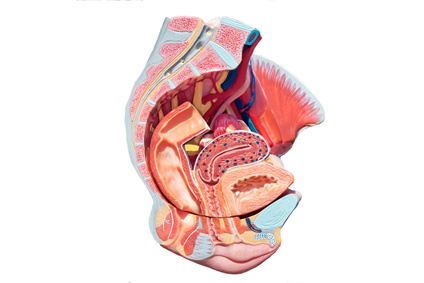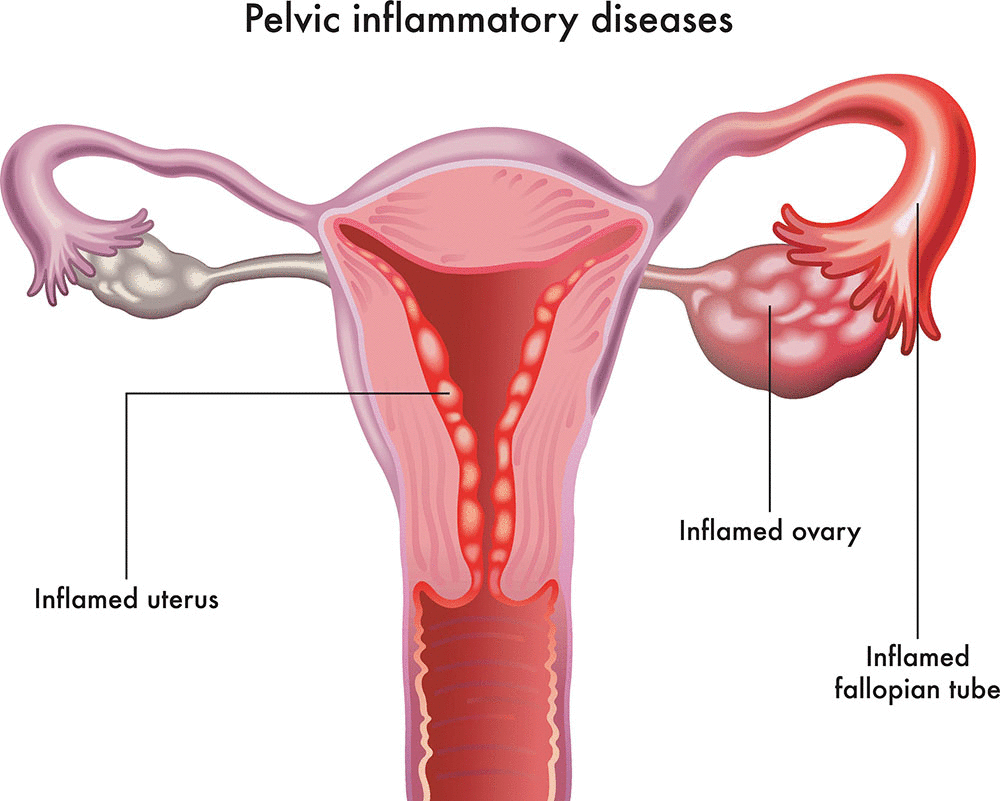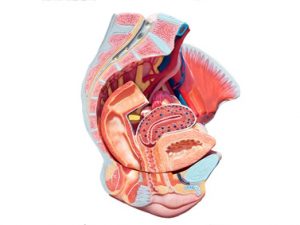
What is pelvic inflammatory disease?
Pelvic inflammatory disease (PID) is an infection of the reproductive organs of women. This may include infection of:
- The Uterus (womb)
- The Cervix (the opening of the womb into the vagina)
- The fallopian tubes (these are the tiny tubes between the ovary and the womb – eggs released by the ovary pass through these tubes)
- The ovaries
The infections that can cause PID include:
- gonorrhoea
- chlamydia
- other bacteria
PID can cause severe illness in a woman, requiring treatment in hospital. However, sometimes PID can occur without causing any signs or symptoms. That is, the woman may not feel sick and may not notice any change in her body. PID is a very serious disease because it can lead to long term problems
PID is one of the leading causes of infertility in women. Women who have had PID may have difficulty becoming pregnant and if they do become pregnant, there may be problems with the pregnancy.

Risk factors
The primary risk factor for PID is infection with a sexually transmitted infection (STI) -in particular, Chlamydia and gonorrhoea
Risk factors for these STIs include:
- Engaging in unsafe sex
- Having sex with more than one partner
- Being in a sexual relationship with someone who has multiple sex partners
What are the symptoms of pelvic inflammatory disease?
Women can have PID without any signs or symptoms. Women may notice:
- pain low in the abdomen
- pain during sex
- abnormal periods (women on the pill may notice this too)
- bleeding after sex
- abnormal discharge
- fevers
- some women become very sick and have severe pain
If you have symptoms suggestive of an STI or think you may have been exposed to one, you should seek medical attention immediately.
How to prevent pelvic inflammatory disease?
Infection with PID can be prevented by avoiding risky sexual behaviours.
To reduce your risk:
- Use latex or polyurethane condoms during sex
- Limit your number of sex partners
- If you have recently been treated or are being treated for an STI, you must make sure your sex partner(s) also receives treatment in order to prevent getting infected again. Sex partners should receive treatment even if they do not have any symptoms.
Remember that using condoms not only protects you from STIs, it also is an effective form of contraception. If you do use other forms of contraception (like the pill, diaphragm and IUCD etc), use condoms as well.
If you or your partner have more than one sexual partner and do not use condoms, have regular sexual health check-ups
If you think you may have been at risk of getting a sexually transmissible infection, you may be at risk of having PID. Have a sexual health check to be sure.
How can pelvic inflammatory disease be diagnosed?
The doctor can test for PID by:
- Examining and taking swabs from your vagina and cervix
- Testing urine for Chlamydia and Gonorrhoea
- Feeling the cervix, uterus and ovaries for any sign of tenderness or pain
- Doing blood tests
If you find out that you do have PID, anyone you have had sex with in the past few months will need to be tested and treated also. This is to make sure that they are cleared of the infection and to prevent you from getting the infection again and needing treatment all over again. If you feel uncomfortable or embarrassed about telling your partner or partners, the doctor or nurse can contact them. This is a confidential process and your name will not be mentioned. This is very important for your health, for your partner’s health, and the health of other people they have sex with.
How to treat pelvic inflammatory disease?
PID is treated with antibiotics. Sometimes three different antibiotics are given.
To ensure the infection has been cured:
- It is important to take all the tablets – otherwise the infection may not be properly cured
- You will be asked to return to your doctor or clinic for follow-up appointments – this will include checking that signs of infection are settling. After you have finished the treatment there will be tests to check the infection is cured.
- It is best not to have sex until the tablets are finished and you have been tested to check the infection is cured (even if you feel better)
- Sexual partners who have the infection should be treated at the same time – otherwise you may get the infection again.
If a woman is very sick with PID, she may need to be admitted to hospital for treatment.
FAQs
What is a pelvic inflammatory disease?
Pelvic inflammatory disease (PID) is infection of the reproductive organs of women. This may include infection of the uterus, uterine cervix, tubes and ovaries or only pert of them.
How to treat pelvic inflammatory disease at home?
The only treatment for pelvic inflammatory disease is with antibiotics. In mild cases the treatment can be given at home with repeat follow up by the Gynaecologist. Severe cases will need to be admitted to hospital for intra-venous antibiotic treatment.
Can pelvic inflammatory disease be cured?
Yes, pelvic inflammatory disease is like any other infection and antibiotic treatment should completely cure it. Only in severe cases or patients that weren’t treated on time, there could develop a chronic pelvic inflammatory disease or other complications such as pelvic adhesions, intrauterine adhesions, infertility, chronic pelvic pain.
How to treat pelvic inflammatory disease?
The only treatment for pelvic inflammatory disease is with antibiotics. In mild cases the treatment can be given at home with repeat follow up by the Gynaecologist. Severe cases will need to be admitted to hospital for intra-venous antibiotic treatment.
How to treat pelvic inflammatory disease?
The only treatment for pelvic inflammatory disease is with antibiotics. In mild cases the treatment can be given at home with repeat follow up by the Gynaecologist. Severe cases will need to be admitted to hospital for intra-venous antibiotic treatment.

